| Srl | Item |
| 1 |
ID:
140460
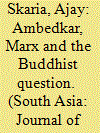

|
|
|
|
|
| Summary/Abstract |
This essay tries to frame one question, which at its most abbreviated can be posed thus: why does Ambedkar convert to Buddhism? Given Ambedkar's militant secularism, to ask this question is also to ask: what assumption of responsibility does that conversion enable which exceeds secular responsibility? This essay tracks how Ambedkar's religion questions both the liberal concept of minority, and the dissolution of the minor that is staged in Marx's critique simultaneously of religion and secularism. Buddhism becomes in the process a religion of the minor.
|
|
|
|
|
|
|
|
|
|
|
|
|
|
|
|
| 2 |
ID:
082350
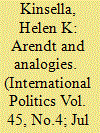

|
|
|
|
|
| Publication |
2008.
|
| Summary/Abstract |
In this essay, I review the argument of Patricia Owens stellar new book, Between War and Politics. Specifically, I engage with, although am skeptical of, her claim that that the current detention camps founded and governed by the United States in the global war on terror are dissimilar to those founded and governed by Germany in the Holocaust
|
|
|
|
|
|
|
|
|
|
|
|
|
|
|
|
| 3 |
ID:
090896
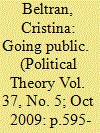

|
|
|
|
|
| Publication |
2009.
|
| Summary/Abstract |
While other theorists have turned to Arendt's analysis of statelessness and superfluity to consider questions of immigration, "illegality," and the status of noncitizens, this essay argues that Arendt's account of labor and her nonconsequentialist account of action offer a richer optic for considering the undocumented in the United States. To explore this claim, this essay constructs an alternate account of the nationwide demonstrations for immigrant rights that occurred in 2006. Rather than defining "success" in terms of replicability or immediate legislative results, the author's analysis of the 2006 protests emphasizes the significance of noncitizens laying claim to the public realm. Considering Michael Warner's concept of counterpublics, the author argues that the demonstrations can be best understood as a moment of initiation and an inaugural performance of the political. Rereading Arendt's notion of animal laborans, the essay concludes by exploring the limitations of noncitizens invoking labor as a way to gain civic standing.
|
|
|
|
|
|
|
|
|
|
|
|
|
|
|
|
| 4 |
ID:
082352
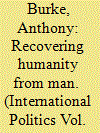

|
|
|
|
|
| Publication |
2008.
|
| Summary/Abstract |
Taking its inspiration from Patricia Owens' important and original new book on Hannah Arendt and international relations, this essay considers how Arendt's many scattered remarks on humanity, world order and cosmopolitanism work for us today - a time when a worthwhile 'cosmopolitanisation' of international law (such that its subjects are individual humans as much as states) coexists with darker appropriations of the idea of humanity to legitimise coercive interventions and liberal imperialism. Whilst agreeing with Owens that Arendt's thought offers us significant critical tools to question the latter, I depart from Arendt's general scepticism of a moral subject called humanity, and argue that the time has come to reaffirm, rather than question, what is especially sacred in 'the abstract nakedness of being human'
|
|
|
|
|
|
|
|
|
|
|
|
|
|
|
|
| 5 |
ID:
108022
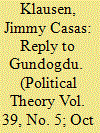

|
|
|
| 6 |
ID:
112366
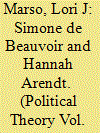

|
|
|
|
|
| Publication |
2012.
|
| Summary/Abstract |
This article compares Hannah Arendt's famous essay on Adolf Eichmann's trial in Israel in 1961 to Simone de Beauvoir's little studied piece, "An Eye for an Eye," on the trial of Robert Brasillach in France in 1945. Arendt and Beauvoir each determine the complicity of individuals acting within a political order that seeks to eliminate certain forms of otherness and difference, but come to differing conclusions about the significance of the crimes. I explain Beauvoir's account of ambiguity, on which she draws in her judgment of Brasillach and elaborates in her 1948 Ethics of Ambiguity, and measure it against Arendt's account of Eichmann's thoughtlessness and its effects on the destruction of conditions of worldly plurality. Linking the failure of ethical judgment on the part of individuals to prior systemic political conditions, Beauvoir helps us recognize struggles over the meaning of bodies and conditions of inequality as central to politics.
|
|
|
|
|
|
|
|
|
|
|
|
|
|
|
|
| 7 |
ID:
112370
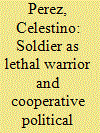

|
|
|
|
|
| Publication |
2012.
|
| Summary/Abstract |
An adequate configuration of the military ethic, which encompasses the U.S. Army's professional and ethical self-understanding, should integrate the soldier's ethicopolitical obligations toward the indigenous other; that is, the person who lives where soldiers are deployed. The argument first posits a distinction between cosmopolitan and patriotic configurations of the soldier's obligations. David Petraeus's counterinsurgency guidance typifies the former; Matthew Moten's configuration of the professional military ethic typifies the latter. Second, Hannah Arendt's distinction between Work and Action instructs that one does not "build" a polity; political foundations are fugitive and unpredictable. Third, considering Arendt's theory and current missions, the soldier as a political agent cannot produce stability or build a nation with instrumental certitude; however, the soldier can foster conditions and intervene in ways to nudge circumstances toward a better state of affairs. Finally, military professionals should cultivate a cosmopolitan attitude informed by William Connolly's ethos of engagement to help them fulfill their obligations to the other.
|
|
|
|
|
|
|
|
|
|
|
|
|
|
|
|
| 8 |
ID:
109939
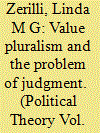

|
|
|
|
|
| Publication |
2012.
|
| Summary/Abstract |
This essay examines the significantly different approaches of John Rawls and Hannah Arendt to the problem of judgment in democratic theory and practice.
|
|
|
|
|
|
|
|
|
|
|
|
|
|
|
|